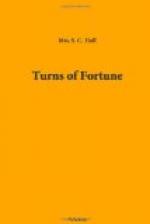Sarah Bond told him she should not feel bound to make this talent of her father’s a crime, by twisting into a secret what he used to do as an amusement. Mr. Cramp urged mildly the folly of this, when she had a defence to make; but she stood all the more firmly upon what she fearlessly considered the dignity of right and truth; at the same time assuring him, she would to the last contest that right, not so much for her own sake, or the sake of one who was dear to her beyond all power of expression, but for the sake of him in whose place she stood, and whose honour she would preserve with her life. Mr. Cramp was a good, shrewd man of business. He considered all Miss Bond’s energy, on the subject of her father’s honour, as romance, though he could not help believing she was in earnest about it. He thought it was perfectly in accordance with the old miser’s character, that he should procure or make such a document; though he considered it very extraordinary, for many reasons, that it should have imposed upon men more penetrating and learned than himself.
Sarah Bond, after his departure, endeavoured to conceal her anxiety from her niece; but in vain. Mabel was too clear-sighted; and it was a relief, as much as an astonishment to her aunt, to see how bravely she bore up against the evil news. Miss Bond did not remember that the knowledge of the power of wealth does not belong to sixteen summers. Mabel knew and thought so little of its artificial influence, that she believed her happiness sprang from birds and flowers, from music, and dancing, and books—those silent but immortal tongues that live through centuries, for our advantage; besides, her young heart welled forth so much hope, that she really did not understand, even if they lost their fortune, their “troublesome fortune,” as she called it, that it would seriously affect their happiness. There was no philosophy, no heroism in this; it was simply the impulse of a bright, sunny, beautiful young mind.
The course of events promised soon to strip Mabel of all except her own bright conceptions. Mr. Alfred Bond urged on his plea with all the energy and bitterness of one who had been for many years despoiled of his right. His solicitor, soon after his claim was first declared, made an offer to Sarah Bond to settle an annuity on her and her niece during the term of their natural lives; but this was indignantly spurned by Sarah; from him she would accept no favour; she either had or had not a right to the whole of the property originally left to her uncle. Various circumstances, too tedious to enumerate, combined to prove that the will deposited in Doctors Commons was not a true document; the signature of Cornelius Bond Hobart was disproved by many; but second only to one incident in strangeness was the fact, that though sought in every direction, and widely advertised for in the newspapers of the day, the witnesses to the disputed document could not be found—they had vanished.




